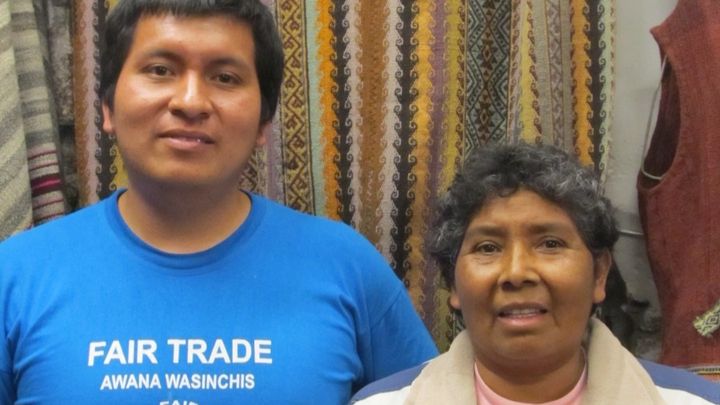
Helping Hands Cusco
Donation protected
I met Rafael and his mother, Modesta, in Cusco, Peru, where they ran a small shop filled with the most beautiful handwoven items I'd yet seen. Since Cusco is the gateway city to Machu Picchu, it is overrun with tourists and the things they buy.
Rafael explained that all the products in his shop were made by hand by weavers who live in villages high in the Andes. These weavers shear their sheep and alpaca, spin the yarn, dye it with natural plants, and weave the shawls and tablerunners, gloves and scarves with traditional, Incan designs using the same simple tools that they have been using for hundreds of years.
 Young boy in traditional dress in Rafael's shop.
Young boy in traditional dress in Rafael's shop.
Rafael and his mother started the shop to give these weavers, who had no access to the tourist market in Cusco, an opportunity to earn a little money in addition to subsistence farming. Following Fair Trade principles, they return 80 percent of the price of a product to the weavers and 20 percent supports the shop. They run the organization as a cooperative--the weavers have a voice in the decisions of the group.
 School kids with donations received by Rafael's organization
School kids with donations received by Rafael's organization
The organization ran on a shoestring, but they managed to improve the lives of 40 weavers and their familiea in 4 villages.

Then came Covid-19. Peru was on lockdown for weeks. The tourist trade vanished. The shop closed. The weavers ran out of money; then they ran out of food.
Things are tough in the US, but even in the worst of times, we usually have resources, and we've had some government support. These people have nothing.
 Weavers and their families in better times in the shop in Cusco.
Weavers and their families in better times in the shop in Cusco.
I've known Rafael for several years. He has always been honest and responsible. Now, he tells me how worried they are; how his mother cries. Some weavers are sick. All of them are hungry.
Dollars go much further in Peru than they do here. Small amounts make a huge difference. I want to send whatever I can raise to Rafael and Modesta as soon as possible. In this time of global hardship, won't you join me?

Thank you.
#helpinghandscusco
Rafael explained that all the products in his shop were made by hand by weavers who live in villages high in the Andes. These weavers shear their sheep and alpaca, spin the yarn, dye it with natural plants, and weave the shawls and tablerunners, gloves and scarves with traditional, Incan designs using the same simple tools that they have been using for hundreds of years.
 Young boy in traditional dress in Rafael's shop.
Young boy in traditional dress in Rafael's shop.Rafael and his mother started the shop to give these weavers, who had no access to the tourist market in Cusco, an opportunity to earn a little money in addition to subsistence farming. Following Fair Trade principles, they return 80 percent of the price of a product to the weavers and 20 percent supports the shop. They run the organization as a cooperative--the weavers have a voice in the decisions of the group.
 School kids with donations received by Rafael's organization
School kids with donations received by Rafael's organizationThe organization ran on a shoestring, but they managed to improve the lives of 40 weavers and their familiea in 4 villages.

Then came Covid-19. Peru was on lockdown for weeks. The tourist trade vanished. The shop closed. The weavers ran out of money; then they ran out of food.
Things are tough in the US, but even in the worst of times, we usually have resources, and we've had some government support. These people have nothing.
 Weavers and their families in better times in the shop in Cusco.
Weavers and their families in better times in the shop in Cusco. I've known Rafael for several years. He has always been honest and responsible. Now, he tells me how worried they are; how his mother cries. Some weavers are sick. All of them are hungry.
Dollars go much further in Peru than they do here. Small amounts make a huge difference. I want to send whatever I can raise to Rafael and Modesta as soon as possible. In this time of global hardship, won't you join me?

Thank you.
#helpinghandscusco
Organizer
Kate Convissor
Organizer
Manchester Township, MI